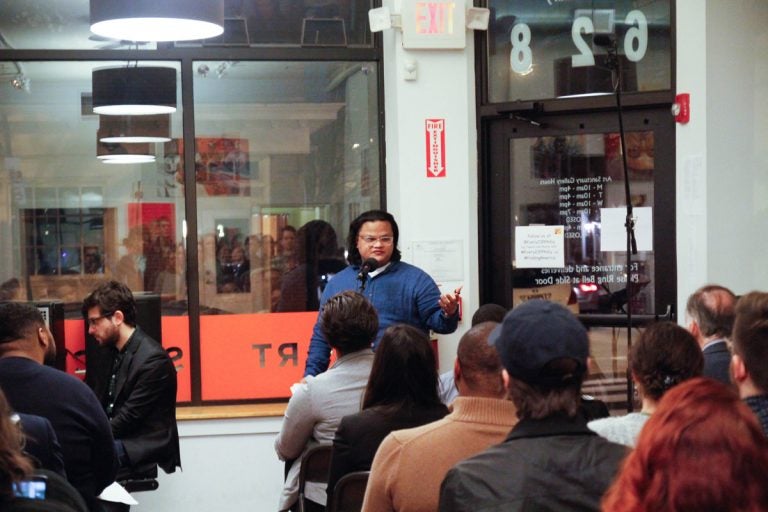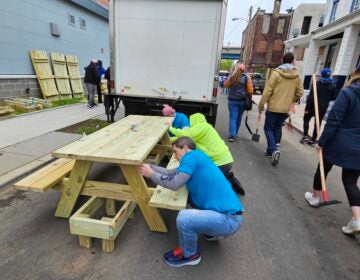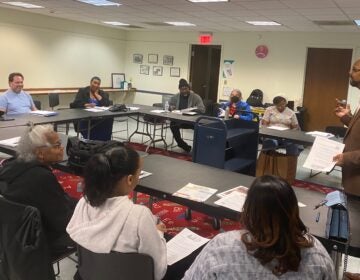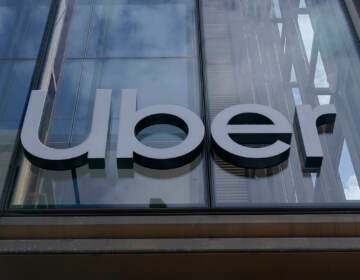An Undocumented Family Finds Relief From a Hack in Logan, 19141

Philadelphia-based organizer and activist Fred Pinguel told this story to a live audience at Every ZIP Philadelphia’s first public storytelling event at Art Sanctuary on March 25th, 2016. An essay version of this story by Fred is included here below.
My family came over to the United States from the Philippines between 1991 and 1992. First my Dad. Then my Mom and me. Then my older brother. And eventually the oldest about a decade later. What I tell people is my Mom took me to Disneyland and we just never went back, which is kind of true. I was 6 at the time so I don’t know if I would have understood it if my mom told me, but I didn’t think I was coming over here to stay. That became pretty clear soon after though.
Our first house was an apartment on Park Avenue near the Olney Broad Street Station, 19141. We didn’t have a car so we walked everywhere. Mostly we walked up Broad Street to the Laundromat, the Thriftway and then down Broad Street to church and school. Broad Street was the dragon’s spine and we rode it to make our lives here in Philadelphia.
A few years in, we moved to an apartment not too far away – still the Logan/Olney area, but a little further east. All of a sudden we were too far from the dragon’s spine so we had to find other places for our necessities. We started going to One and Olney Plaza, on Front and Olney. We walked from 12th Street to Front Street, down Olney Avenue. Once there, we’d go to Caldor for household items or clothes. My brother and I would check out Funcoland for the video games. That was our Sundays. We always capped it off by going to Shoprite for groceries.
Shoprite was big and yellow. My mom or dad would push the cart down the aisles stocking our lives for the next week. Canned goods, meat, bread, soda. Pretty much everything except rice (they don’t sell good rice in America grocery stores, at least not back then). The cart would be so full by the end of our two hours at the store that I wouldn’t be able to see the bottom.
We didn’t have a car so the next step would be to pay, load it up into our granny cart (the kind that folds), and walk the mile plus back to our house with everything we bought. My Dad and brother would take turns push and pulling that overstuffed aluminum cart back home. It took a beating, metal pieces bulging out and popping off a wheel would get wobbly. But what could we do? We didn’t have a car and had no means to get one.
So we walked.
One Sunday we wrapped up shopping and my Mom and I were standing on the sidewalk waiting for something when this elderly gentleman approached us. He had grey hair and a newsboy cap. He had a collar peeking out over his sweater underneath a khaki jacket. He smiled at my mom and asked:
“Do you folks need a hack?”
My mom and I looked at each other and then back at the man. He repeated.
“Do you folks need a hack ride?”
My mom looked down at me and asked in Tagalog:
“Dek ano ng sinasabi nya?”
“Dek (that’s my nickname) what’s he saying?”
My mom speaks perfect English, but at the time she was getting used to idioms and couldn’t quite figure out what this man was asking. I looked behind him and told my Mom:
“I think he’s offering to give us a ride.”
Behind the man was a big station wagon, wood paneling on the sides wide as a boat. It was very brown.
My Dad joined us at this point and talked to the man. His name was William and he agreed to his offer. Five dollars to drive all of us and our groceries back home.
We loaded the groceries into the back of the station wagon, three bags per hand. I sat in the back with my Mom and my brother, while my Dad sat up front.
To go from walking with the wobbly wheel to a ride home was a minor miracle. It meant we had the rest of our Sunday to look forward to. We would still have some energy when we returned home to continue the grind of living as a young, undocumented family in Philadelphia. We still had to put the groceries away. Cook dinner. Do homework. Get school uniforms ready. A ride instead of walking made all of that more manageable. More possible.
This became our routine for a few years and we got to know William. He was retired and hacked for extra income. He had a big raspy laugh and was pretty gregarious, especially compared to the quiet Filipino foursome in his car. Once in a while we would miss him and we’d have to get another hack, but William was our go-to guy. We even had his number in case we needed special occasion or emergency rides. It was in my Mom’s aluminum Rolodex under W.
Eventually my Mom got her license and we bought a car – a very ugly brown Ford Tempo. We started travelling further and further out. Mostly importantly, we could make it to One and Olney on our own. We lost touch with William as a result.
I’m sure he’s passed now. He was elderly by the time I met him. But I wonder if he ever thought of us? The Filipino family on Somerville Ave.
There’s a diversity of experiences for undocumented people, but for us, it was kind of like being on a lifeboat. You’re safe, but only tenuously. We were on our own for the most part. But once in a while there was a line that bobbed up in the water. We would grab it and it would pull us along. Those lines connected us to other boats, other people, and communities – a life.
I wouldn’t be the man I am without my family, but I don’t know if we would have made it without those lifelines we found. Like the kind William, probably unintentionally, threw to us that Sunday 20 years ago. He helped pull us along back to shore.
WHYY is your source for fact-based, in-depth journalism and information. As a nonprofit organization, we rely on financial support from readers like you. Please give today.




